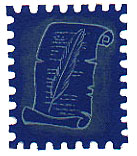
|
|
Poetry
|
"Shall I Compare Thee to a Backfill Pile?"
April 27, 2000
|
|
by William J. Feeney
|

Motivated by the article "Poetic Visions of the Past" in the March/April issue, I send three poems extracted from a sequence based on experiences in World War II. A few have been published, but the enclosed, related to my nonprofessional interest in archaeology, have not. If one or more of the three are of interest, I am pleased to share them.
Comparative Anatomy
Normandy, 1944
The German staff car had caromed off a wall
And burned with sudden intensity.
Unnaturally erect in the driver's seat
The blackened body retained human semblance,
Grimace of teeth, shattered forearm.
Years later I saw photographs
Of Bronze Age bodies found in Danish bogs.
Chemicals in the muck darkened them,
Spared them orthodox descent to dust,
Kept shriveled skin taut on bones.
At Tollund Fen, workers cutting peat
Came upon such a body, male,
Curled up there for twenty centuries,
An executioner's noose around his neck.
|
For more on the Danish bog bodies, see the Silkeborg Museum Website.
Domitian XV
Aachen, 1944
Bulldozers doing the work of pushbrooms
Swept piles of rubble from the streets,
Clearing a path for burdened trucks
Moving through mausoleum Aachen.
Along the shoulders of the path,
Mounds of timber, brick, and stone.
Picking my way across this trash,
Looking down, I found a coin,
On its face a bloated profile,
Faint inscription, DOMITIAN XV.
I had a box of coins back home,
The gauche mintage of a young nation
Still in love with Buffalo Bill,
A gold piece, a silver dollar,
A faded quarter bearing the date
Eighteen sixty-three, a year
Famed for war and oratory,
A coin I touched with deep respect
Because of its antiquity.
Now it seemed a johnny come lately.
Before Lindbergh, or Gettysburg,
Before the righteous Pilgrim Fathers
Walked the woods in their silly hats,
Even before the restless Vikings
Steered their dragon-ships to Vinland
Aachen was a royal city,
Urbs Aquensis, urbs regalis.
Charlemagne the Frankish king
Crowned in Aachen, crowned in Rome
Emperor of the Western World,
Entombed in his beloved Aachen
Within a Roman sarcophagus.
Centuries before, Domitian's
Legionnaires put down revolts
In German provinces. Perhaps
A stumble-fingered Roman soldier
Assigned to occupation duty
In Aachen dropped the coin I found.
Before Domitian, cultist Celts,
Lovers of mysterious waters,
Worshipped at the sulphur springs
Until the Romans pushed them out,
Made the springs into a bath,
Rest and recreation center,
Named it for a local Celtic
God of healing, Aquae Granni.
Tides of power swept through Aachen,
German kings with iron crowns.
Europe's statesmen gathered there
To fabricate uneasy peace.
Napoleon and Josephine
Paid the town a ritual visit,
She to drink the mineral water,
He to strut as emperor,
Acknowledge bows of German kings,
Pose at the tomb of Charlemagne,
Massive bookends pressing eras
Of Europe's troubled history.
He would give the coup de gras
To end the Holy Roman Empire,
And in time provide employment
For those who fashion mausoleums.
Now, emplaced amid the rubble,
Dim descendants of conquering
Celts, Italians, Germans, French,
Kin of Puritans and cowboys,
Who think of kings as playing cards,
Who count their history in decades.
Vigilant MPs guard the tomb
Of Charlemagne the Holy Roman
From casual hunters of souvenirs.
|
For more on Domitian, see "New Digs in Rome," January/February 1996.
For more on Charlemagne at Aachen, see The Historical Charlemagne and
About the City of Aachen.
The Munster Archeological Zone
Germany 1945
Only necessary persons at the train station,
No vendors selling bogus artifacts.
It was night time, we a sleepy lot,
Once sick or injured soldiers
Returning to our units
Via the replacement depot
On the far side of Munster.
The zone was on our line of march.
Moonglow made it seem theatrical.
The only sound effects, boots on pavement,
And scuttle, rodents? self-reliant cats?
Within the zone the road was well maintained,
Though there should have been markers,
The King's Palace, the Temple of Sacrifice...
Too, we were moved along
(Often true of package tours)
So quickly that we couldn't see it all.
A vanished people had built with brick,
One could trace foundations,
Portions of wall remained,
Otherwise destruction had been total.
So had it been in other places,
Caused by earthquake, fire, flood,
Warriors breaching fortress walls.
Troy was a pousse-café of cities,
Homer's in the midst of them,
New cities staunchly rising,
Dead ones mined for useful stone,
Until folk energy abated
And Troy became a desolation.
In London, city of survival
(Antique wood and plaster London
Burned, revived in brick and stone,
Then mauled by Heinkel 111's),
Archaeological bombs unearthed
Restoration trinkets, graves
For victims of bubonic plague,
Ruins of a Roman temple.
In Munster, had the bricks been stacked
For yet another layer of buildings?
|
For more on Munster (in German), see www.muenster.de.
Back to Poetry

© 2000 by the Archaeological Institute of America
archive.archaeology.org/online/features/poetry/feeney.html |

